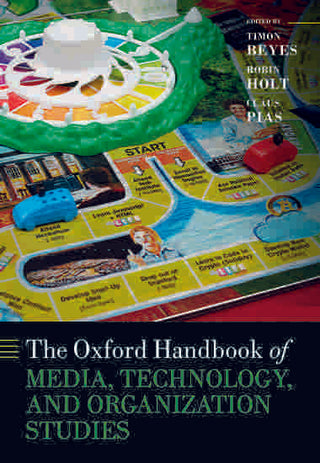The Oxford Handbook of Media Technology and Organization Studies
- Unit price
- / per
-
Author:Timon Beyes / Robin Holt / Claus Pias
-
ISBN:9780198809913
-
Publication Date:December 2019
-
Edition:1
-
Pages:560
-
Binding:Hardback
-
Publisher:Oxford University Press
-
Country of Publication:United Kingdom


A Back Order button means that we don’t have the book in stock at our store. It may already be on order – or we can order it for you from a publisher or distributor at no additional cost.
As we source items from around the globe, a back-order can take anywhere from 5 days to several weeks to arrive, depending on the title.
To check how long this might take, you’re welcome to contact us and we can provide an ETA or any other information you need. We recommend checking the timeframe before committing to an online order.
The Oxford Handbook of Media Technology and Organization Studies
- Unit price
- / per
-
Author:Timon Beyes / Robin Holt / Claus Pias
-
ISBN:9780198809913
-
Publication Date:December 2019
-
Edition:1
-
Pages:560
-
Binding:Hardback
-
Publisher:Oxford University Press
-
Country of Publication:United Kingdom
Description
Our most basic relationship with the world is one of technological mediation. Nowadays our available tools are digital, and increasingly what counts in economic, social, and cultural life is what can be digitally stored, distributed, replayed, augmented, and switched. Yet the digital remains very much materially configured, and though it now permeates nearly all human life it has not eclipsed all older technologies.
This Handbook is grounded in an understanding that our technologically mediated condition is a condition of organisation. It maps and theorizes the largely unchartered territory of media, technology, and organization studies. Written by scholars of organisation and theorists of media and technology, the chapters focus on specific, and specifically mediating, objects that shape the practices, processes, and effects of organisation.
As the first sustained and systematic interrogation of the relation between technologies, media, and organisation, this Handbook consolidates, deepens, and further develops the empirics and concepts required to make sense of the material forces of organization.
Adding product to your cart
You may also like
A Back Order button means that we don’t have the book in stock at our store. It may already be on order – or we can order it for you from a publisher or distributor at no additional cost.
As we source items from around the globe, a back-order can take anywhere from 5 days to several weeks to arrive, depending on the title.
To check how long this might take, you’re welcome to contact us and we can provide an ETA or any other information you need. We recommend checking the timeframe before committing to an online order.
You may also like
You may also like
-
Our most basic relationship with the world is one of technological mediation. Nowadays our available tools are digital, and increasingly what counts in economic, social, and cultural life is what can be digitally stored, distributed, replayed, augmented, and switched. Yet the digital remains very much materially configured, and though it now permeates nearly all human life it has not eclipsed all older technologies.
This Handbook is grounded in an understanding that our technologically mediated condition is a condition of organisation. It maps and theorizes the largely unchartered territory of media, technology, and organization studies. Written by scholars of organisation and theorists of media and technology, the chapters focus on specific, and specifically mediating, objects that shape the practices, processes, and effects of organisation.
As the first sustained and systematic interrogation of the relation between technologies, media, and organisation, this Handbook consolidates, deepens, and further develops the empirics and concepts required to make sense of the material forces of organization.
-
-
Author: Timon Beyes / Robin Holt / Claus PiasISBN: 9780198809913Publication Date: December 2019Edition: 1Pages: 560Binding: HardbackPublisher: Oxford University PressCountry of Publication: United Kingdom
Our most basic relationship with the world is one of technological mediation. Nowadays our available tools are digital, and increasingly what counts in economic, social, and cultural life is what can be digitally stored, distributed, replayed, augmented, and switched. Yet the digital remains very much materially configured, and though it now permeates nearly all human life it has not eclipsed all older technologies.
This Handbook is grounded in an understanding that our technologically mediated condition is a condition of organisation. It maps and theorizes the largely unchartered territory of media, technology, and organization studies. Written by scholars of organisation and theorists of media and technology, the chapters focus on specific, and specifically mediating, objects that shape the practices, processes, and effects of organisation.
As the first sustained and systematic interrogation of the relation between technologies, media, and organisation, this Handbook consolidates, deepens, and further develops the empirics and concepts required to make sense of the material forces of organization.
-
Author: Timon Beyes / Robin Holt / Claus PiasISBN: 9780198809913Publication Date: December 2019Edition: 1Pages: 560Binding: HardbackPublisher: Oxford University PressCountry of Publication: United Kingdom
-



